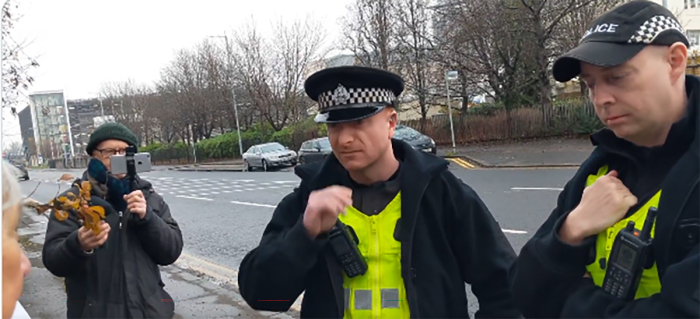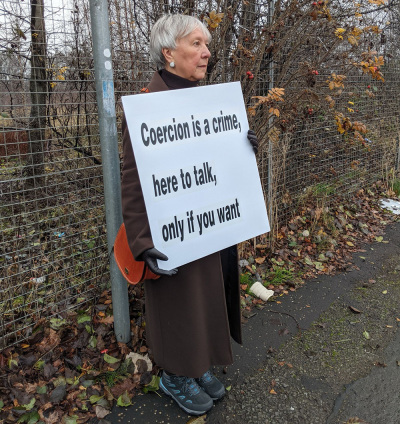
A Scottish prosecutor has dropped the case against a 75-year-old woman arrested earlier this year for holding a sign with the message “coercion is a crime” and offering help to women outside a hospital where abortions are performed.
The woman, Rose Docherty, had been arrested on Feb. 19 near Queen Elizabeth University Hospital in Glasgow for standing within 200 meters of the facility while displaying a sign that read, “Coercion is a crime, here to talk, only if you want,” ADF International, which supported Docherty, reported.
The area falls under a “buffer zone” covered by a new law that prohibits behavior deemed as harassment or influence in relation to abortion services.

Docherty, who had been standing silently and not obstructing anyone, was offered a formal warning that required her to admit wrongdoing and agree not to repeat the action. She rejected the warning and refused to accept guilt, leading the Procurator Fiscal’s office to initiate legal proceedings.
The case has now been dropped and the warning has been withdrawn.
Reacting to the decision, Docherty said it was a win for anyone who believes in the right to peaceful conversation.
“I stood with love and compassion, ready to listen to anyone who wanted to talk. Criminalizing kindness has no place in a free society,” she said.
Lorcan Price, legal counsel for ADF International and a barrister from Ireland, said the decision was overdue.
“No one should fear arrest for offering a consensual conversation,” Price said. “Rose’s case is a stark example of how ‘buffer zone’ laws can be weaponized to silence peaceful expression.”
ADF International, which provides legal assistance on freedom of expression issues, said it had warned that the law could lead to overly broad enforcement.
Scottish Green Party MSP Gillian Mackay admitted in February that silent prayer near a window inside one’s own home could be treated as a violation of the same law, depending on who was passing by. Her comment was made during an interview on BBC’s “Scotcast” podcast, where she said that “performative prayer” visible to the public might fall within the scope of prohibited activity.
Mackay’s statement came despite her earlier criticism of U.S. Vice President J.D. Vance, who had said in a speech at the Munich Security Conference that even private prayer could be criminalised under Scotland’s buffer zone law. Mackay had dismissed those comments as “shameless misinformation” before conceding that silent prayer visible from a window could be interpreted as illegal conduct.
Lois McLatchie Miller, a Scottish spokesperson for ADF International, said that Mackay’s admission validated concerns raised about the legislation.
“Less than a year after the law coming into force, Gillian Mackay has admitted that it could impact silent prayer even in private homes, depending on who’s passing by the window. And what’s more, we’ve seen an innocent grandmother arrested just for offering conversation,” she said.
In May, a five-member delegation from the U.S. State Department under President Donald Trump traveled to Britain to meet with individuals who had been arrested for silent protest or prayer outside abortion clinics, CP reported.
The delegation, led by senior adviser Samuel Samson from the Bureau of Democracy, Human Rights and Labor, also met with British officials and questioned the media regulator Ofcom about the Online Safety Act.
During the visit, the delegation met with Docherty, Isabel Vaughan-Spruce, Adam Smith-Connor, Livia Tossici-Bolt, and Fr. Sean Gough. All had been arrested or convicted for their silent presence near abortion facilities in cities including Glasgow, Birmingham and Bournemouth. The meetings were held in a private office where the activists shared details of their experiences with arrest and legal action.
The U.S. State Department also expressed concern over such cases, calling on governments in Scotland and elsewhere to protect freedom of expression. “We call on governments, whether in Scotland or around the world, to respect freedom of expression for all.”














